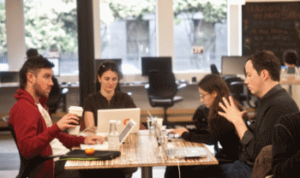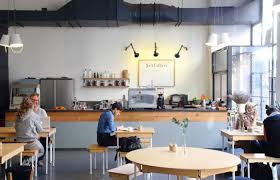Considering the ‘Coffice Economy’
 This is a new piece of research which highlights another important function of café spaces – as places not only of co-working for independent workers, but as places where business and work takes place more generally.
This is a new piece of research which highlights another important function of café spaces – as places not only of co-working for independent workers, but as places where business and work takes place more generally.
The discount voucher website MyVoucherCodes has recently released some data which suggests that:
- 4/5 people in the UK have spent at least 3 ½ hours working from a coffee shop each week;
- 1/3 have closed a business deal (with an average value of £1,732);
- 67% said their place of work supported the idea of working from a coffee shop;
- 1 in 3 have attended a job interview in a coffee shop (although 43% of people are worried about lack of privacy in the coffee shop);
- the average working session in a coffee shop lasts for 93 minutes;
- the average worker spends up to £10 on food/drink for each time;
- the average consumer spends over £2,160 a year working from a coffee shop in the UK (which is 8% of their salary), and this climbs to nearly £2,600 for the self-employed worker.
Sources: (YourMoney, 2017 and LondonLovesBusiness, 2017).
 Cafés are spaces of multiple possibilities from a places to simply get a coffee, places to seek solitude in public, to places where you can meet acquaintances to do business. They are important social, and increasingly economic spaces, in the urban (and sometimes not so urban) landscape.
Cafés are spaces of multiple possibilities from a places to simply get a coffee, places to seek solitude in public, to places where you can meet acquaintances to do business. They are important social, and increasingly economic spaces, in the urban (and sometimes not so urban) landscape.
“The data shows that coffee shop workers have great success in closing business deals, valued at an average of £1,732 each, representing an estimated £14.53 billion contribution to the UK economy” (Sunday Post, 2017).
This is not a small amount of money, and the importance of these café spaces in the urban landscape requires recognition. There are clearly a lot of people seeking alternative places than the traditional office to work and do business, for a variety of reasons. Increasingly businesses that provide coffee and work space or ‘co-working spaces’ are seen as more economical workspaces than rented office space too – and there are a range of examples that have been appearing across the globe (as I explored in my recent talk about co-working spaces), as well as a number of cafes which have sought to combine the coffee and workspace as part of their business model (TimberYard in London area a good example).
The findings of this piece of research are interesting, but require further investigation, not only in terms of considering the implications for people who want to work in cafés, but for the café industry itself – Do cafés encourage/discourage the use of their space for work? How do you manage the patterns discussed above when running a café? What are the implications of the ‘coffice economy’ – all things I have begun to explore and hope to continue to do so in the future.


